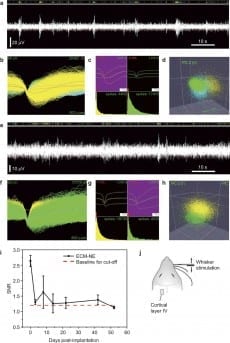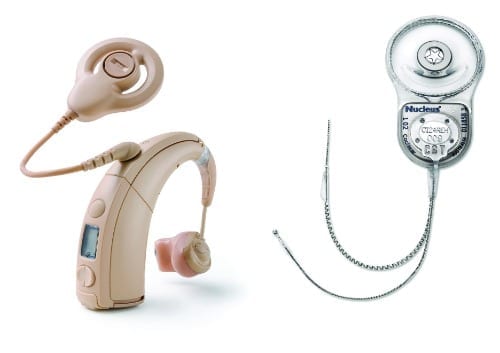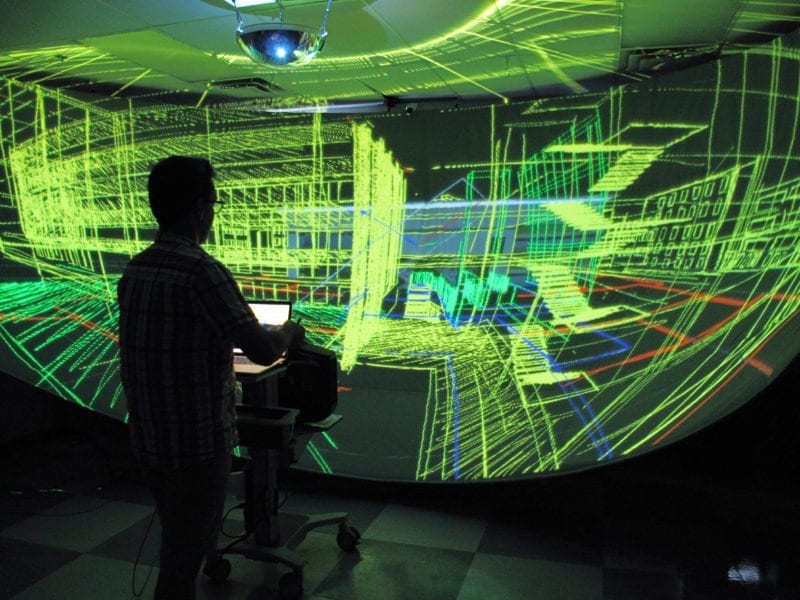
Recent research published in the journal Microsystems & Nanoengineering could eventually change the way people living with prosthetics and spinal cord injury lead their lives.
Instead of using neural prosthetic devices—which suffer from immune-system rejection and are believed to fail due to a material and mechanical mismatch—a multi-institutional team, including Lohitash Karumbaiah of the University of Georgia’s Regenerative Bioscience Center, has developed a brain-friendly extracellular matrix environment of neuronal cells that contain very little foreign material. These by-design electrodes are shielded by a covering that the brain recognizes as part of its own composition.
Although once believed to be devoid of immune cells and therefore of immune responses, the brain is now recognized to have its own immune system that protects it against foreign invaders.
“This is not by any means the device that you’re going to implant into a patient,” said Karumbaiah, an assistant professor of animal and dairy science in the UGA College of Agricultural and Environmental Sciences. “This is proof of concept that extracellular matrix can be used to ensheathe a functioning electrode without the use of any other foreign or synthetic materials.”
Implantable neural prosthetic devices in the brain have been around for almost two decades, helping people living with limb loss and spinal cord injury become more independent. However, not only do neural prosthetic devices suffer from immune-system rejection, but most are believed to eventually fail because of a mismatch between the soft brain tissue and the rigid devices.
The collaboration, led by Wen Shen and Mark Allen of the University of Pennsylvania, found that the extracellular matrix derived electrodes adapted to the mechanical properties of brain tissue and were capable of acquiring neural recordings from the brain cortex.
“Neural interface technology is literally mind boggling, considering that one might someday control a prosthetic limb with one’s own thoughts,” Karumbaiah said.
The study’s joint collaborators were Ravi Bellamkonda, who conceived the new approach and is chair of the Wallace H. Coulter Department of Biomedical Engineering at the Georgia Institute of Technology and Emory University, as well as Allen, who at the time was director of the Institute for Electronics and Nanotechnology.
“Hopefully, once we converge upon the nanofabrication techniques that would enable these to be clinically translational, this same methodology could then be applied in getting these extracellular matrix derived electrodes to be the next wave of brain implants,” Karumbaiah said.
Currently, one out of every 190 Americans is living with limb loss, according to the National Institutes of Health. There is a significant burden in cost of care and quality of life for people suffering from this disability.
Read more: UGA’s Regenerative Bioscience Center collaborates in development of brain-friendly interfaces
The Latest on: Neuroprosthetics
[google_news title=”” keyword=”neuroprosthetics” num_posts=”10″ blurb_length=”0″ show_thumb=”left”]
via Google News
The Latest on: Neuroprosthetics
- Neuroprosthetics Market To Hit USD 30.26 Billion By 2031, Says SNS Insideron April 17, 2024 at 8:46 pm
The neuroprosthetics market is revolutionizing healthcare by offering life-altering solutions for individuals with neurological disorders, nerve injuries, and sensory impairments. These devices ...
- Neuroprosthetics Market to Hit USD 30.26 billion by 2031, says SNS Insideron April 16, 2024 at 5:01 pm
According to SNS Insider, the Neuroprosthetics Market was valued at USD 11.71 Billion in 2023 and is projected to reach USD 30.26 Billion by 2031. The neuroprosthetics market is revolutionizing ...
- Brain's Cerebellum Could Help Direct Prosthetic Limbson April 16, 2024 at 12:35 am
The findings were published April 12 in the journal Science Advances. “These results could help make neuroprosthetics an option for patients with damage to the motor cortex due to brain injury ...
- Boosting the brain's control of prosthetic devices by tapping the cerebellumon April 15, 2024 at 9:00 am
Neuroprosthetics, a technology that allows the brain to control external devices such as robotic limbs, is beginning to emerge as a viable option for patients disabled by amputation or ...
- Optogenetics Illuminates Cerebellum's Role in Neuroprostheticson April 15, 2024 at 7:39 am
The field of neuroprosthetics, which enables the brain to operate external devices like robotic limbs, is starting to gain traction as a potential treatment option for individuals who are ...
- Mapping The Mind: Advances In Understanding Speech Productionon April 8, 2024 at 9:45 am
A more robust understanding of the human brain could improve techniques for diagnosing and treating neurological disorders and pave the way for more advanced neuroprosthetics to assist individuals ...
- Neuroscience Breakthrough: How Our Brains Sense Body Position And Movementon April 4, 2024 at 8:01 am
Moreover, this research opens up new avenues for advancements in neuroprosthetics, potentially leading to more natural and intuitive control of artificial limbs. Overall, the study marks a ...
- Neuroprosthetics Market to Reach $26.12 Billion by 2030, Says Coherent Market Insightson March 10, 2024 at 5:01 pm
Neuroprosthetics Market is anticipated to witness a CAGR of 10.9% during the forecast period 2023-2030, owing to the growing prevalence of neurological disorders and advancements in technology ...
- Sensory bionic limbs: a success story for neuroprostheticson August 9, 2022 at 5:00 pm
Giacomo Valle is a postdoctoral researcher at ETH Zurich (Switzerland), working in the field of neuroengineering and neuroprosthetics. His research focuses on the development of neurotechnology that ...
via Bing News










